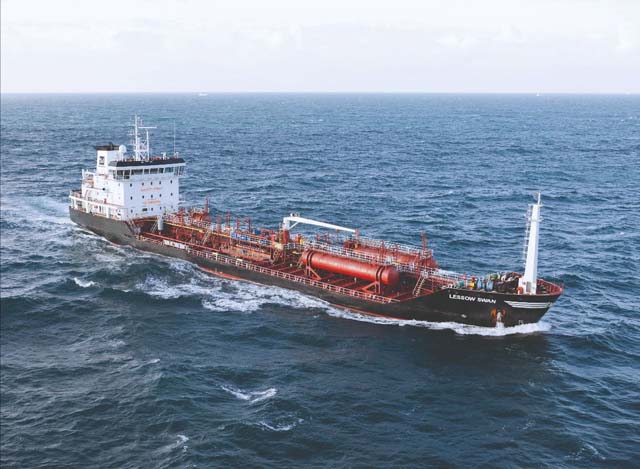Danish tanker operator Uni-Tankers has confirmed that installing a new control system from Berg Propulsion has been pivotal in achieving a 15-17% efficiency gain on board two existing ships, in a retrofit project that has significantly reduced fuel consumption and emissions.
The efficiency gains reflect the installation of Berg’s MPC800 control systems and an upgrade of main engines on board the chemical tankers Anhout Swan and Lessow Swan to run in variable rpm mode. IMO targets envisage a 40% reduction in greenhouse gasses from ships by 2030. Next year, owners face a new IMO regime on ship efficiency, demanding they adhere to the EEXI index and provide their CII. Each ship’s EEXI rating is generated with reference to an Energy Efficiency Design Index (EEDI) baseline.
While ships built today may be designed for optimal fuel efficiency at lower speeds, those delivered 7-15 years ago were optimised for higher engine loads. With fuel prices at unprecedented levels, suboptimal performance by propulsion systems running at ‘part load’ is a cost inefficiency that can eat into competitiveness. The ability to control power more effectively using variable speeds cuts energy use overall, reducing both fuel consumption and emissions.
Uni-Tankers consulted Berg Propulsion and Zeppelin on its options to enhance the efficiency of the 2008-built tankers Anhout Swan and Lessow Swan operating at 14 knots. Berg simulations demonstrated that, in combination, the precise control available to the MPC800 system and a modification of the ships’ four-stroke MaK 8M32C main engines would deliver significant efficiency gains for CP propellers and thrusters.
Jonas Nyberg, MD West, Berg Propulsion, said: “This is an excellent example of the way vessels already in operation can be optimized to anticipate the transition to the EEXI and CII regimes. The aim is to stay ahead of the curve and help our customers move towards greener operations with lower CO2 emissions by offering solutions which also enhance competitiveness.”
Installing the MPC800 control system upgrade is one of several class-approved options devised by Berg Propulsion to help ships rise to efficiency challenges. In close cooperation with owners and operators, Berg analyses a ship’s current and future operational needs, evaluates its EEXI rating, and uses 3D scanning and modelling tools to develop retrofit options that offer cost-based efficiency gains, also factoring in any necessary drydocking work.
Magnus Thorén, Energy & Efficiency team leader, Berg Propulsion, said: “The objective is to deliver efficiency gains where they are needed most. Variable speed control allows the owner to achieve significant efficiency improvements by delivering greater engine responsiveness to changing loads.”
Mattias Hansson, Global Account Manager, Berg Propulsion, added: “Our way to measure the success of a project is how much benefit our total integrated main propulsion solutions will bring for our customers operation. We are pleased for the very good and open cooperation with Uni-Tankers and with our dealer Erik Hass at Zeppelin in Denmark to enable these efficiency upgrades in order to maximise the gains in ship performance and lowering the total cost of ownership.”
Other Berg retrofit options include propeller blade optimization (including replacement), the installation of a Net Frequency Stabiliser so that the shaft generator can operate in variable speed and upgrading the control system software to enable ‘Dynamic Drive’ cruise control. The Dynamic Drive is a software package that is installed in the Berg control system to optimise the propeller pitch and propeller rpm for any given condition.



